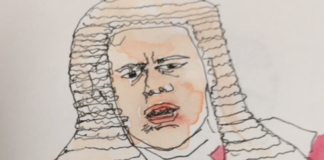- Legal eagle - 19th February 2026
- Round Robin - 19th February 2026
- Dark speak easy part one - 18th February 2026

Criticism is mounting of the extraordinary sacking of the man at the top of the Post Office (PO) as it has now emerged he had nothing to do with the huge scandal which has engulfed the organisation (although other senior officials in place at the time are still there), as well as that he may have been told to delay compensation payouts so the Tories could win the election. It all, once more, puts centre stage the crucial role of Wales in the enormous controversy.
 The incredible firing of Henry Staunton as PO chairman by Secretary of State for Business Kemi Badenoch came in the wake of the disgraceful PO affair, with further disturbing revelations coming to light (see story soon).
The incredible firing of Henry Staunton as PO chairman by Secretary of State for Business Kemi Badenoch came in the wake of the disgraceful PO affair, with further disturbing revelations coming to light (see story soon).
Over 700 sub-postmasters and mistresses were wrongly prosecuted based on faulty data from Fujitsu software called Horizon (or because it allowed unauthorised access to computer records), between 1999 and 2015, with some innocent people going to prison for false accounting and theft, while many were financially ruined. There were four suicides.
He proclaimed to the Sunday Times (ST): “Early on, I was told by a fairly senior person to stall on spend on compensation and on the replacement of Horizon, and to limp, in quotation marks – I did a file note on it – limp into the election”.

Ms Badenoch has, in turn, accused Mr Staunton of lying. She said her statement about these comments, ‘told the truth’, and declared to MPs that the interview was a “disgrace” as well as a “blatant attempt to seek revenge”. Mr Staunton, for his part, responded by saying that he found her announcement “astonishing”.
Critics have claimed she showed petulance by saying to MPs that “serious matters such as bullying”, were being examined and concerns had also been raised about his “willingness to co-operate” with the formal investigation.

However, Mr Staunton stated that this is a probe largely “into the chief executive, Nick Read”, and Rishi Sunak has pointedly refused to repeat Ms Badenoch’s allegations.
Meanwhile it has emerged that the boss of the PO wrote a letter to ministers saying he would stand by the prosecution of more than 350 of the sub-postmasters convicted in the scandal.

The Mr Read referred to by Mr Staunton sent the letter to Justice Secretary Alex Chalk in January, informing him that the PO would be “bound to oppose” appeals against at least 369 prosecutions.
The letter was dated the day before the UK Government announced plans for a new law to exonerate and compensate sub-postmasters who had been wrongly convicted.
Private Eye appears to endorse growing concern about the sacking of Mr Staunton, and has stated: “…the one boardroom change business secretary and sole Post Office shareholder Kemi Badenoch has made is to fire a man who wasn’t actually involved in the scandals of the false prosecutions and the subsequent cover-up”.

However the magazine has pointed out that others who were in place for the latter REMAIN at the PO, notably the Chief Financial Officer (CFO) and Operations Director (OD) Alisdair Cameron.
It has also published details of the apparent closeness between the Conservative (C) party and the PO, saying: “Evidence obtained by the Eye of cosiness at the top of the Post Office, its IT supplier Fujitsu and the governing Tory party at the height of the cover-up of Britain’s largest miscarriage of justice poses serious questions about collusion, the suitability of the current postal services minister to handle the fall-out, and even a new cover-up within the cover-up”.
 All of this has come hard on the heels of revelations that the PO used racist categorisations to group Horizon suspects, such as “negroid types” (see story soon).
All of this has come hard on the heels of revelations that the PO used racist categorisations to group Horizon suspects, such as “negroid types” (see story soon).
Major questions are being asked, too, about the public money that has been used in awarding contracts to Fujitsu.
The Commons Treasury Committee has disclosed that Fujitsu was to have received more than £3.4 billion from Treasury-linked organisations since 2019, yet the IT firm has admitted it knew of faults in its Horizon system as far back as 1999. Chairwoman of the committee, Tory MP Harriett Baldwin said she “hopes this will aid transparency and scrutiny around the role of Fujitsu as a public sector supplier”.
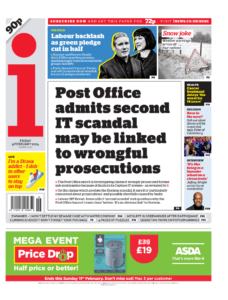 The i newspaper has published more alarming details. On its front page it screamed how the PO may have wrongly prosecuted people because of a SECOND faulty IT system called Capture. The Labour MP Kevan Jones said: “It’s an obvious link to Horizon”.
The i newspaper has published more alarming details. On its front page it screamed how the PO may have wrongly prosecuted people because of a SECOND faulty IT system called Capture. The Labour MP Kevan Jones said: “It’s an obvious link to Horizon”.
These latest unbelievable events highlight the critical part Wales has played in the outrage, and they shine the spotlight, too, on the ITV drama ‘Mr BATES VS THE POST OFFICE’, that kick-started the latest round of publicity, and which was filmed, largely, in North Wales.
Documents show that the present leader of the Liberal Democrats (LD) Sir Ed Davey, was advised as PO affairs minister in 2010 to meet Mr Bates for “presentational reasons” to avoid ‘bad publicity’.

Ms Badenoch said she removed Mr Staunton after concerns were raised about PO governance generally, along with her worry about “the entire business model”.
But one of those affected by his terrible ordeal at the hands of PO executives in Wales, told The Eye: “This is the least we can expect. I have been fighting for years, and my health has suffered terribly. This is just too little too late”.

Another senior official in the frame is Paula Vennells who was Chief Executive Officer (CEO) between 2012 and 2019. She handed back her CBE, which was awarded “for services to the Post Office…”, and has now been formally stripped of the honour.
Ms Vennells had her CBE taken away by the King for “bringing the honours system into disrepute”.
The star of MR BATES VS THE POST OFFICE (actor Toby Jones) portrays the despair of former Llandudno sub-postmaster Alan Bates, as he reads the reason she had been given the honour originally. The transmission was on air only a few weeks ago, although the problems began years before.

It followed the story of Mr Bates, who with his wife Suzanne Sercombe, used life savings in 1998 to buy the PO branch in Llandudno. Mr Bates refused to accept liability like many other sub-postmasters and sub-postmistresses, yet officials terminated their contract with just three months’ notice. It meant the couple lost the £65,000 they had invested.
It has also emerged that he wrote to the UK Government criticising the timing of compensation payouts (viewed as inadequate anyway).

 He said in a January 22 letter that the scheme needed a “radical boot up the backside”, and he has also stated elsewhere that he received a “cruel” compensation offer.
He said in a January 22 letter that the scheme needed a “radical boot up the backside”, and he has also stated elsewhere that he received a “cruel” compensation offer.
In his letter to PO Minister Kevin Hollinrake, Mr Bates said claims from some victims were being processed too slowly.

A key player at the PO then was Angela van den Bogerd. She too featured in the broadcast and, along with the head of the organisation, Ms Vennells, was described as part of “the gruesome twosome!”. Ms van den Bogerd was named afterwards as ‘Head of People’ at the Football Association of Wales (FAW). Her arrival led to the abrupt departure of the organisation’s headline-grabbing chief at the time, Jonathan Ford, who left losing a vote of no-confidence, following an astonishing civil war inside the organisation, which has never been fully explained by the mainstream media. Ms van den Bogerd’s appointment came despite the fact that she had been found by a judge to have “obfuscated” and “misled” a court, and she is shown in the drama in tears as she reads the judgement.
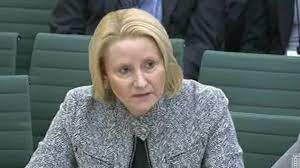
She was an integral part of the PO’s complaints and mediation scheme, and in 2015 Ms van den Bogerd appeared before MPs at a select committee inquiry into Fujitsu’s Horizon computer system (which played a part in the show too). She has also co-authored at least one internal PO report on its relationship between sub-postmasters and mistresses, and that system, while in 2018 she was made ‘Business Improvement Director’. Ms van den Bogerd has now departed from the FAW as well.

The Eye’s disclosure of crucial facts like these, came amid news that one sub-postmaster who lived between Swansea and Merthyr Tydfil explained how he (along with others) had tried to take his own life, while another Welshman talked about his marriage going on the rocks. Mark Kelly, who ran the Brondeg Post Office, from 2003 until 2006, has like others described publicly the terrible impact on him, of the wrongful accusation from the PO that he had stolen money. He said that it had “made me feel guilty and depressed, over the years, I started then to blame myself and I tried to end my life a few times”.

Mr Kelly proclaimed: “I can’t really socialise as much as I used to and I can’t actually manage some tasks – I can’t handle stress”. He has described how he went to senior managers at the organisation, believing he had worked out how the errors were happening, but he said the company “didn’t want to know” and wanted to “bury it”. He eventually resigned, losing the business and then his house, and it meant he and his wife decided not to start a family. Mr Kelly, who now runs a mobile phone repair and accessory shop in Neath Market, hopes his story will “help everyone”.

But Mr Kelly is not alone in having these suicidal thoughts because of the incorrect allegations. Another former PO worker, Jennifer O’Dell, said she had also considered killing herself and suffered from recurring night terrors. She had been wrongly accused of stealing almost £10,000 from a post office in Cambridgeshire. Speaking at the end of the first week of an independent inquiry into what happened, Ms O’Dell said she had researched how to take her own life, and suffered from depression and Post-Traumatic Stress Disorder (PTSD).
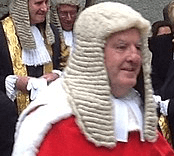
The inquiry (led by retired Welsh judge Sir Wyn Williams) was to hear evidence about the design of the defective computer system which made the mistakes (or allowed the unauthorised access), as well as the failings in the investigation.
A further victim of the PO’s tactics, Tim Brentnall, from Roch in Pembrokeshire, said the scandal led to the breakdown of his marriage because of “trust issues”, and he was prosecuted in 2010 after a £22,000 ‘shortfall’ was discovered at his branch, but his conviction was overturned. Mr Brentnall has told how his sister, who ran a local hotel at the time, was also affected because “people tarred her with the same brush”. And he said in the years that followed his conviction, there was a “whispering campaign”, in the community with people calling him a “thief” and a “fraudster”.

Following the overturning of his convictions, he is now working in the Roch shop again, but said the business would never recover financially with its turnover down from £500,000 to £100,000.
In addition to apologising, the PO declared: “In addressing the past, our first priority is that full, fair and final compensation is provided and we are making good progress”.
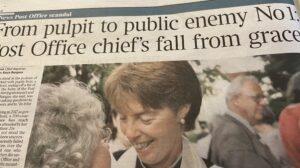
It has been revealed that Ms Vennells’ CBE was pushed through by Theresa May’s Government, DESPITE the fact that the honours committee raised concerns about the scandal. As Ms Vennells (who is also an ordained Church of England [C of E] priest) gave back her CBE she issued a controversial statement of ‘apology’ which appeared to minimise her own role, and put the blame squarely on the IT system at the heart of the affair.

Financial issues are also coming to the fore today, amid growing alarm that some of the innocent victims have yet to receive a penny in compensation. Questions are being asked about how the PO’s books were signed off by external auditors, and as one of those wrongly accused said in the broadcast: “Where did the money go?!”. Accountants from EY and PwC are braced to be put under the microscope at the public inquiry into it all. It’s emerged that the PO may have underpaid more than £100 million in tax while overpaying its senior executives (like Ms Vennells and possibly Mr Staunton). Dan Neidle of Tax Policy Associates (TPA) has proclaimed that the PO paid less tax by deducting payments to victims of the scandal from its profits.

Later, in 2017, Ms Vennells was shortlisted to become Bishop of London, one of the C of E’s most senior positions, and in her statement Ms Vennells said she had “listened” to the sub-postmasters and others, calling for her to return her CBE. She declared: “I am truly sorry for the devastation caused to the sub-postmasters and their families, whose lives were torn apart by being wrongly accused and wrongly prosecuted as a result of the Horizon system”, and the decision generated enormous headlines both in the UK and abroad. Yet to her critics this is not a true apology at all, it is merely saying sorry that “devastation” was caused as “a result of the Horizon system”, which is entirely different.

She emphatically did NOT say ‘I am sorry for what I have done’. It is claimed, however, that Ms Vennells bears responsibility for prolonging the torment of those who have been affected, and still faces questions about the receipt of bonuses worth £2.2 million.
Meanwhile scrutiny about these amazing events have grown, along with concern about the way executives behaved and the public contracts that have been awarded to Fujitsu. As The Economist has put it: ‘Paula Vennells…responded to concerns about Horizon by referring to assurances from Fujitsu that the software was “like Fort Knox”. What that really meant was that the Post Office did not know what was going wrong’.

An anonymous member of the Horizon team speaking to Computer Weekly (CW) in 2021 proclaimed: “everybody in the building knew… (the software) was a bag of shit, it had gone through the test labs God knows how many times, and the testers were raising bugs by the thousand”.
HM Treasury and HMRC are among 21 public sector organisations now being asked by MPs to reveal details about the contracts given to Fujitsu. The Commons Treasury Committee says it wants to discover the extent to which taxpayers’ money has been spent on contracts with the company since 2019. The Welsh Government (WG) has also faced criticism over the Fujitsu contracts awarded in Wales.

One of the contracts there relates to Smart ticketing systems for concessionary travel schemes by Transport for Wales, and together with another, it is worth £2,037,251.46. It began in August 2022, meaning it was awarded after the scandal came to light and following the launch of a UK Government inquiry the previous year.

In an emergency business select committee hearing in the UK Parliament, which was prompted by outrage after the drama was broadcast, Fujitsu admitted the firm have a “moral obligation” to contribute to compensation for sub-postmasters and mistresses wrongly prosecuted as a result of its faulty software.
Paul Patterson Fujitsu’s European manager, said that they had “clearly let society down, and the sub-postmasters down”, although he gave evidence to the PO which was then used to prosecute innocent managers, and he added that the PO knew about “bugs and errors” in their Horizon accountancy software early on.

Mr Read appeared alongside Mr Patterson in front of the committee, but was criticised for not having provided information to them about key events in the timeline.
Now MORE criticism may follow, that the wrong person was sacked, and there were instructions to delay compensation payments to help the Tories, amid a scandal in which Wales has been so central…

Details of our Editor, Welshman Phil Parry’s astonishing decades-long journalistic career (when the misdeeds of major organisations were often reported), as he was gripped by the rare and incurable neurological condition Hereditary Spastic Paraplegia (HSP), have been released in an important book ‘A GOOD STORY’. Order it now.
Regrettably publication of another book, however, was refused, because it was to have included names.

Bigger mail sack part two is next month, where The Eye show how racist categorisations were used to class complainants, and further evidence that the enormous scandal has led to a huge row at the highest level of the UK Government.









